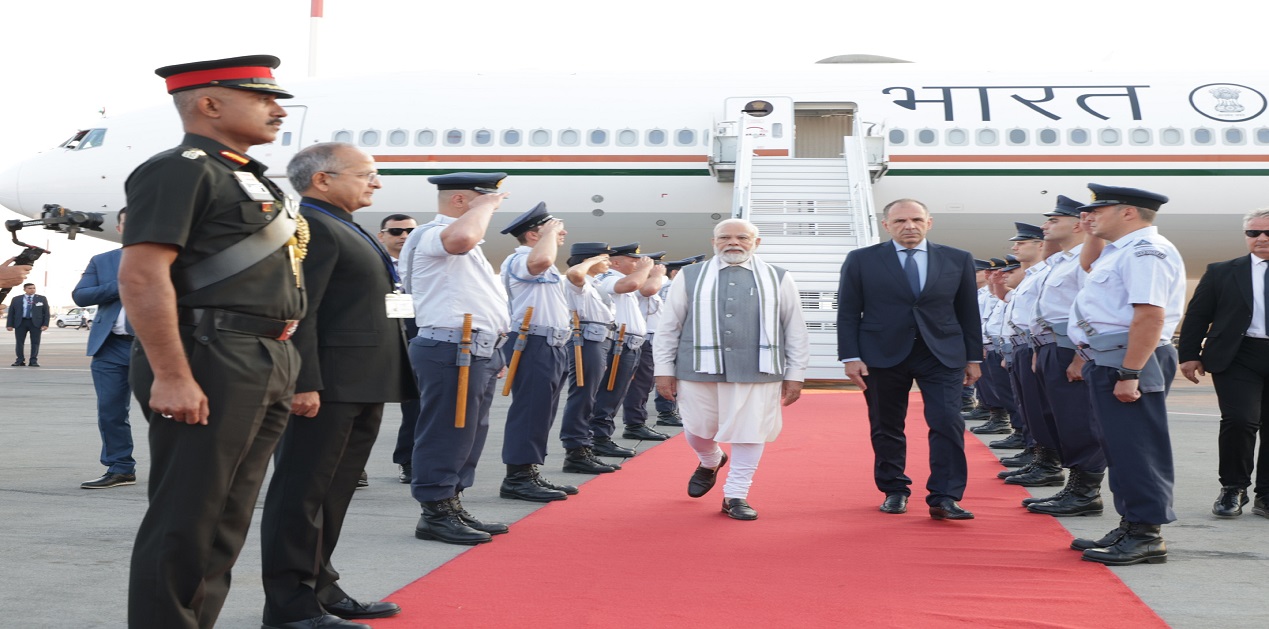The Prime Minister of India, Mr Narendra Modi, paid an official visit to Athens recently.
Mr Modi represents modern India, a country the average Greek knows very little about.
As far as India is concerned, the Greek collective memory is dominated by images from Indian tear-jerkers of the 1950s and 1960s with film stars like Nargis and Madhubala and songs which found their way to a Greek audience via cover versions.
Beyond this, the Greek image of India is that of a very poor, populous and remote Asian country, whose population faces a struggle to survive.
One Greek-India link, though one largely forgotten in Greece, is the presence in Bengal of a Greek community of scholars, scientists and traders who settled there in the mid-18th century and stayed until Indian independence in 1947. Then there is the well-known trading company Ralli Bros, which continues to flourish in the country, though it has now been nationalized. Calcutta's Greek Orthodox Church and Greek cemetery bear witness to the Greek presence over two centuries in the region.
During my tenure as Greek Ambassador to India, some 20 years ago, I came to believe that the future would belong to India, which was a steadily developing large Asian country. I also saw that Greece could benefit a great deal from the development of bilateral relations of friendship and cooperation.
India had already shown supported Greece vis-a-vis the Cyprus issue on international fora and at the UN since the 1950s, through the Non-Aligned Movement and the personal friendship between Prime Minister Nehru and Archbishop Makarios. And we, in turn, have long considered India to have a clear right to a permanent seat on the UN Security Council, given its size and population, and Greece will support such a move when the Organization undertakes its next round of reforms.
Since the Non-Aligned era, the pressure brought about by changes to the international balance of power and new tensions hasseen India come to perceive the emergence of an economically and militarily powerful China as a source of new threats in Asia. It has adopted a friendlier stance towards the West, in response, though without abandoning its belief in a multi-polar world.
India today is the most populous country on the planet, having recently overtaken China. It is also the fifth largest economy in the world, with the prospect of its becoming the world's third economic power within three to five years.
Almost every sector is extremely dynamic, with pharmaceuticals and manufacturing especially strong and Indian tech at a level to support a full-blown space programme. Indian businessmen are global players, seeking out interesting investments around the globe, while an astounding 75% of the CEOs of major companies around the globe are of Indian origin!
The Indian theory of growth is modelled on the steady progress of an elephant, rather than the tiger's leap favoured by other Asian economies; the more sedate pace is seen as more sustainable in the long run, allowing firmer foundation to be laid in every sector.
Let us add some numbers to this dynamic picture, to illustrate the sheer scale of the Indian economy: Indian private airlines recently placed orders for no fewer than one thousand new aircraft from Airbus and Boeing to meet the needs of their domestic and international flights!
At this point, it should be mentioned that some 250 million Indians travel abroad annually, both for business and recreationally with their families. This statistic should certainly be of interest to the competent Greek authorities and lead them to draw up a policy designed to increase the number of visitors from the subcontinent through the setting up of permanent consular authorities in key Indian cities along with a Greek Tourism Organization office. In essence, what is required is a new tourism plan which takesit into account that Indian visitors could visit our country ten months a year.
In terms of ongoing collaborations, GMR, a major Indian international construction company, is already engaged in a joint venture with the Greek company TERNA; together, they are constructing the new airport in Kastelli, Crete, which will be the second largest airport in the country after Athens.
Bilateral relations between Greece and India are viewed as excellent, and there are multiple areas of convergence. What's more, recent years have witnessed systematic work on both sides to improve our relationship still further. As the recent joint exercises involving units of the Greek and Indian navies and air forces in Greek territory made clear, there are also multiple possibilities for cooperation in the field of bilateral defence.
It was this new India that Greek Prime Minister Mitsotakis met in the person of Indian Prime Minister Modi. The development of long-term ties with this great Asian nation will be of paramount importance as they lead to closer political and economic cooperation in sectors including shipping, foodstuffs, ports, construction, as well as investment.
I consider this visit to be of particular importance and a springboard for a new bilateral relationship in which multifaceted cooperation can gradually develop into a strategic relationship that will be beneficial to both sides in various spheres over the decades ahead.
(The paper is the author’s individual scholastic articulation. The author certifies that the article/paper is original in content, unpublished and it has not been submitted for publication/web upload elsewhere, and that the facts and figures quoted are duly referenced, as needed, and are believed to be correct). (The paper does not necessarily represent the organisational stance... More >>
Image Source: https://www.pmindia.gov.in/wp-content/uploads/2023/08/H20230825137173.jpg










Post new comment